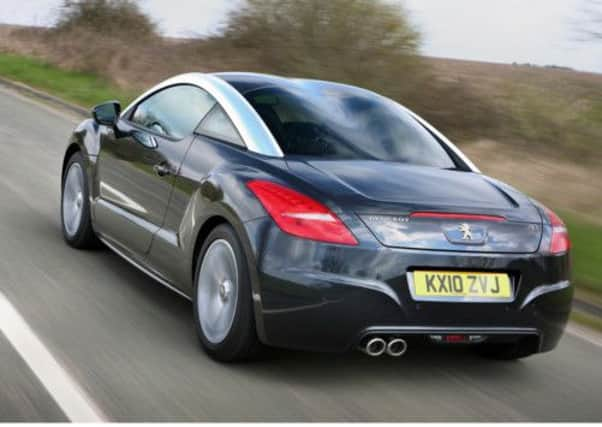Peugeot RCZ: Foreign Exchange


And while we in Scotland talk fondly of the Auld Alliance, we’re sometimes tarred with a big British brush. On my first visit to Brittany quite a few years ago, I encountered what I subsequently discovered was a traditional form of insult to the British. “Rist bif and ze Yawk-she puddeeng” was shouted at me by a group of youths as I drove through a village in my British registered Ford Capri.
Things seem to have changed in the intervening decades – we’re all one big happy European family after all – and not just in the Bretons’ attitude to visitors from the other side of the Channel.
Advertisement
Hide AdAdvertisement
Hide AdWhen I was last there, it was so hot, local council workers had to scatter grit onto the road surface to combat the melting tar. This time, we saw some blue sky but it was a rare sight, in between frequent rain showers.
Driving in France is a bit trickier now too. In the past all you had to worry about was your GB badge on the back, some filters on your headlights to alter the dipped beam from left to right and to remember to drive on the wrong side of the road. Now there are speed traps everywhere and it’s illegal to have camera detectors in the car, even if they’re part of your sat-nav system. There’s also a multitude of things you have to carry in your car all the time, including spare light bulbs, warning triangle, reflective jacket and, most recently, a breathalyser kit with two disposable breathalysers.
It’s also recommended to carry your vehicle registration document and insurance certificate – and even your MoT paperwork if your car is more than three years old. The drink-drive limit is lower than in the UK and if you’re caught speeding by more than 40km/h you’ll have your driving licence confiscated.
All of that is enforced by on-the-spot fines and don’t think you’ll get away with it if you don’t have the euros with you – the gendarmes will be more than happy to escort you to the nearest cash machine.
However, after our latest week in Brittany I can report that there are also a lot of positives to taking to the roads over the Channel. For a start, those roads are on the whole beautifully surfaced and smooth without the need for the pothole-dodging skills which have to be employed over here. The roads are quieter too – it’s a big country and, away from the cities, you can often travel for kilometres without meeting another vehicle.
We plumped for Brittany because it’s pleasantly rural, boasts a rich Celtic culture and heritage and it’s easy to get to – just a short hop over the Channel from England’s south coast. Brittany Ferries, a privately owned French company started by Breton farmers, offer a handful of services through a total of seven vessels, including a high speed ferry.
We opted to sail from Poole to Cherbourg – a four-hour daytime crossing – and because virtually all the crew on board are French, you feel the holiday starts as soon as you get on board. For a car and two people, including an air-conditioned outside cabin with ensuite, the fare was £420 return… and the fact that you’ve been at sea adds a special dimension to the holiday.
It’s a popular route for tourists travelling to northwest France to avoid the long trek south from the summer bottlenecks around Calais and the Chunnel. Brittany Ferries carries around 2.5 million passengers and 750,000 cars a year to France, and to Santander and Bilbao in northern Spain. Food is a big part of the experience – every year they serve 22 tonnes of langoustines, 15 tonnes of smoked salmon and a quarter of a million breakfasts. Not just that but their onboard duty free shops sell so much of the smelly stuff that they’re the third largest retailer of perfumes in France.
Advertisement
Hide AdAdvertisement
Hide AdThe weather may not have been brilliant for us but our chosen transport was first class. I wanted something suitably French and those nice people at Peugeot obliged with the latest diesel version of their RCZ sports coupe, now in its third year of production but still as dramatic as when it first appeared in concept form at the Frankfurt Motor Show in 2007.
It does a brilliant job in combining stunning looks and lively performance with great economy. Over more than 1,500 miles, including the long trek south and back again with the cruise control set at the legal limit, I still averaged 47 mpg overall. On the way back I filled up in Cherbourg with diesel at 1.29 Euros a litre (just over £1) and that took me all the way back to Glasgow with 100 miles range left in the tank.
Technically the RCZ is a four-seater but the rear seats are minute and suitable only for infants. But with them folded down, there’s a huge loadspace which swallows an amazing amount of luggage – and, as I discovered, several cases of some very reasonably-priced vin rouge from Bordeaux.
VITAL STATS
CAR Peugeot RCZ GT HDi 163
PRICE £25,835 (£27,905 as tested)
PERFORMANCE Max speed 137 mph; 0-62 mph 8.7 secs
MPG combined 53
CO2 EMISSIONS 139 g/km